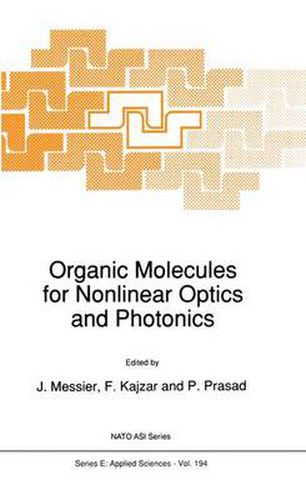Readings Newsletter
Become a Readings Member to make your shopping experience even easier.
Sign in or sign up for free!
You’re not far away from qualifying for FREE standard shipping within Australia
You’ve qualified for FREE standard shipping within Australia
The cart is loading…






This title is printed to order. This book may have been self-published. If so, we cannot guarantee the quality of the content. In the main most books will have gone through the editing process however some may not. We therefore suggest that you be aware of this before ordering this book. If in doubt check either the author or publisher’s details as we are unable to accept any returns unless they are faulty. Please contact us if you have any questions.
Photonics is being labelled by many as the technology for the 21st century. Because of the structural flexibility both at the molecular and bulk levels, organic materials are emerging as a very important class of nonlinear optical materials to be used for generating necessary nonlinear optical functions for the technology of photonics. Since the last NATO advanced research workshop on Polymers for Nonlinear Optics held in June 1988, at Nice - Sophia Antipolis, France. there has been a tremendous growth of interest worldwide and important development in this field. Significant progress has been made in theoretical modeling, material development, experimental studies and device concepts utilizing organic materials. These important recent developments provided the rationale for organizing the workshop on Organic Materials for Nonlinear Optics and Photonics which was held in La Rochelle, France, in August 1990. This proceeding is the outcome of the workshop held in La Rochelle. The objective of the workshop was to bring together scientists and engineers of varied backgrounds working in this field in order to assess the current status of this field by presenting significant recent developments and make recommendations on future directions of research. The workshop was multidisciplinary as it had contributions from chemists, physicists, materials scientists and device engineers. The participants were both from industries and universities. The workshop included plenary lectures by leading international scientists in this field, contributed research papers and a poster session. Panel discussion groups were organized to summarize important developments and to project future directions.
$9.00 standard shipping within Australia
FREE standard shipping within Australia for orders over $100.00
Express & International shipping calculated at checkout
This title is printed to order. This book may have been self-published. If so, we cannot guarantee the quality of the content. In the main most books will have gone through the editing process however some may not. We therefore suggest that you be aware of this before ordering this book. If in doubt check either the author or publisher’s details as we are unable to accept any returns unless they are faulty. Please contact us if you have any questions.
Photonics is being labelled by many as the technology for the 21st century. Because of the structural flexibility both at the molecular and bulk levels, organic materials are emerging as a very important class of nonlinear optical materials to be used for generating necessary nonlinear optical functions for the technology of photonics. Since the last NATO advanced research workshop on Polymers for Nonlinear Optics held in June 1988, at Nice - Sophia Antipolis, France. there has been a tremendous growth of interest worldwide and important development in this field. Significant progress has been made in theoretical modeling, material development, experimental studies and device concepts utilizing organic materials. These important recent developments provided the rationale for organizing the workshop on Organic Materials for Nonlinear Optics and Photonics which was held in La Rochelle, France, in August 1990. This proceeding is the outcome of the workshop held in La Rochelle. The objective of the workshop was to bring together scientists and engineers of varied backgrounds working in this field in order to assess the current status of this field by presenting significant recent developments and make recommendations on future directions of research. The workshop was multidisciplinary as it had contributions from chemists, physicists, materials scientists and device engineers. The participants were both from industries and universities. The workshop included plenary lectures by leading international scientists in this field, contributed research papers and a poster session. Panel discussion groups were organized to summarize important developments and to project future directions.